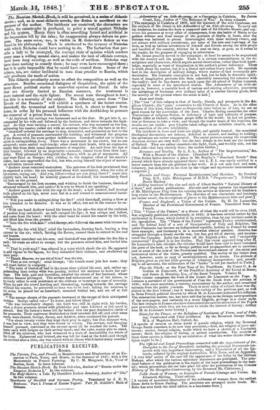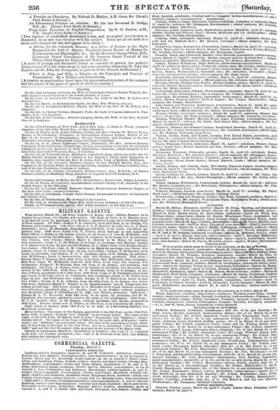PUBLICATIONS RECEIVED.
The Parson, Pen, and Pencil; or Reminiscences and Illustrations of an Ex- cursion to Paris, Tours, and Rouen, in the Summer of 1847; with a few Memoranda on French Farming. By C. M. Musgrave, M.A., Vicar of Borden, Kent. In three volumes. The Russian Sketch-Book. By Ivan Golovine, Author of" Russia under the Emperor Nicholas I." In two volumes. The Half-Sisters; a Tale. By Geraldine Endsor Jewsbury, Author of" The." In two volumes. Specimens of Swedish mid German Poetry. Translated by J. E. 1). Bethune. Part I. Poems of Esairus Tegner. Part .1L Schuss'sMaid of Orleans. Adventures elf as Aide-de-mop; or a Campaign in Calabria. By James Grant, Esq., Author of " The Romance of Wee In three volumes.' [The campaign in Calabria of 1806, and the manners of the wild Calabrese, are the subjects of Mr. Grant in his Adventures of an Aide-de-camp. To carry out his intention, he makes the hero a supposed aide of Sir Charles Stuart; and con- trives his presence at every affair of consequence, from the battle of Maids to the genera deleuce and final escape of the garrison of Scylla in boats, After the fortress was battered to pieces. Intermingled with these military events, and not always with military consistency, are tales of the love and marriage of the hero as well as various adventures of himself and friends among the wild people and banditti of the country, whither he is sent on duty, ur goes, as it seems to the reader, for the purpose of engaging in adventures. Mr. Grant possibly served in the campaign; at least he seems to be acquainted with the scenery and the people. There is a certain vraitiouthlance in the de- scriptions and characters, which argues actual observation, rather than book know- ledge, especially as want of imagination is the author's prime deficiency. There Is truth about his matter, but it is a literal and rather heavy truth. He succeeds best in the description of military doings, where matter-of-fact necessarily pre- dominates. His dramatic conception is not bad, but he fails in dramatic want of imagination prevents him from coherently connecting the romance with the reality.; and he has drawn too ninth upon the old school of Italian romance especially in some of his introduced stories. The Adventures of an Aide-de; camp is, however, a readable book of various and sthring adventure, possessing the advantage of freshaess over military tales of a similar literary grade, from the novelty of the ground where the scene is laid.]
Loss and .Gain.
[The "loss "of this volume is that of family, friends, and prospects in the An- glican Church; the "gain," couvenion to the Church of Rome. As in the other fictions of this kind, which have so frequently come before us of late, we see no good reason for the conversion of the hero. Charles Reding resembles the other Tractarians of religious fiction, in deficiency of logic and infirmity of purpose. People differ at Oxford; religious people differ in the world; he has not penetra- tion or firmness to takes view; and though the reader hears of his inquiries, the results are not visible: poor Charles takes refuge in an infallible church, on its own assertion of its own The incidents in Loss and Gain are slight, and quietly treated: the occasional theological discussions are tedious, deficient in science, and leading to nothing; the sectarians are rather exaggerated. The social pictures among the respectable Anglican divines are very well; but the best things in the book are the sketches of Oxford. They are rather onesided—the light, weak, and worldly side, not the black side—hut very cleverly done; the malice hidden.] Romance and Reality. By L. E. L., Author of "Time 1111prOViSatriCO3" &C. With a Memoir of the Author. (Standard Novels.) [This fiction better deserves a place in Mr. Bentley's "Standard Novels" than several which have already appeared there: but L. E. L. was surely entitled to a better memoir than the one prefixed to her work. It is not only curt and unsa- tisfactory, but disfigured in its close by the vulgar and mysterious insinuations of a reporter.] Biscuits and Grog: Personal Reininiseences'and Sketches, By Percival Plug, R.N., (late Midshipman of H.M.S. Preposterous.") Edited by .James Hannay. [A shilling brochure of the size and style of Albert Smith's " Natural Ilistory of a Gent," and similar publications. Bircraer and Grog narrates the experiences of Mr. Midahipman Plug from his entering the service at thirteen till he finishes a long cruise in the Mediterranean. The sketches of sea characters and incidents are rather smart, the descriptions of places in the, ktediterrauean trite and poor.)' France and England; a Vision of the Future. By M. De Eamartine, Member of the Provisional Government of France. Translated from the French. [This "Vision of the Future," or a dream of what the world will be circa 1943, was originally published anonymously, in 1.*48; it has been revived rather by the excitement in France, which ended in its revolution than by any intrinsic merit ill the speculation. The "Vision of the Future" retimeents France revolutionized, and time federal head of a sort of incorporation of Italy and Belgium; the entire Peninsula has become an independent republic, looking to France for moral force example; and Germany is in a somewhat similar position. America has struggled through a bloody servile war, but has got rid of slavery, and incorpo- rated the Canadas. India has thrown off the English yoke; and "exclusively commercial" England is in her decline. Had this vision appeared long after BL De Lamartine's late circular, the circular would have been said to have contained the germ of the book, so far as foreign polities and propagandism are in question; just as some of the acts of the Provisional Government savour of the social and economical views of the vision greatly modified. The reality of the future does not, however, seem so easy Of accomplishment as its dream. The attitude of Belgium gives as yet but little .promise of volentary. incorporation; and, accord- ing to all accounts, the millennium of the "banks" is not yet reached in Paris.] Pius the Ninth; or the First Year of his Pontilicate. By Count C. A. de Geddes de Lianconrt, of the Pontifical Academy of the Lineal at Rome; and James A. Manning, Esq., of the Inner Temple. Volume 11.
[This volume completes the work of she Count De bancourt on the Pope. It
contains a narrative of the government of the Ninth from the autumn of 1846; with some anecdotes, a running commentary by the author, and occasional extracts from the public journals. There is more unity of subject than was dis- played in the first volume ; but it wants the variety of the previous part, as well as those French political theories by which M. de Liancourt animated his inflation. The substantial matter. too, has been told day by day in We foreign correspoudence of the newspapers, and certainly in a more English, perhaps in a closer style. The late changes in France also have diminished the current attraction of the Pope's past proceedings, while they are too near to attain the interest of history: neither does M. de Liancourt write history.] Hints for the Times; or the Religions of Sentiment, of Form, and of Feel. dug, Contrasted midi Vital Godliness. By the Reverend George Smith, M.A. of Magdalen Hall, Oxford, &c. [A species of sermon on three kinds of pseudo religion, which the Reverend George Smith considers to be now very prevalent,—first, the religion of were ben - timent; second, formal religion, under which we have a sketch of a Tractarian career; third, the religion of feeling, or animal constitution. The analysis of these three species is followed by an exhibition of what the writer thinks true re- ligion ought to be.] The Official and Legal Proceedings connected with the Appointment of Dr. Hampden to the See of Hereford; including the principal Documents con- nected with this important controversy, and a Translation of all tbe tracts, collated by the original Authonties. With Notes, and an AppenmnL [A very brief notice of the case till the appearance of the letter by the unrteen Bishops, after which the various epistolary documents are published. The prin- cipal feature of the publication is the report of the legal proceedings in the mat- ter; which proceedings did not take place till after the publication of the Concise History of the Hampden Controversy, by the Reverend Mr. Christmas) Nobk Deeds of Woman; or Examples of Female Courage and Virtue. By Elizabeth Stirling. Third edition. [A variety of anecdotes illustrative of the nobleness of woman, from the earliest times down to Grace Darling. The anecdotes are arranged under heads. Mr. Bohn has sent forth the third edition ins handsome form.] A Treatise on Chemistry. By Richard D. Hoblyn, A.M. Oxon, &c. (Scott's First Books in Science.) An Elementary Treatise on Aiyelzra. By the late Reverend B. Bridge, B.D &c. Scott's First Books itt Science.) Progressive zercises in English Composition. By R G. Parker, A.M., US. (Scott's First Books in Science.) [Two reprints of established elementary books, and an original introduction to chemistry, by an able man familiar with his subject. These are all set forth in a stout cover adapted for use, and.appear to be cheap.] A Mirror for the .fohannite Masons; in a Series of Letters to the Right HonOnrabie the Earl of Aboyne, Provincial Grand Master of Masons for Northampton and Huntingdon, &c. By the Reverend George' Oliver, D.D., Lieutenant Grand Commander of the Supreme Grand Council of the Thirty-third Degree for England and Wales, &c. [A series of gossipy and discursive letters on masonry in general, the author's reminiscences of it, his views about it, and some questions respecting St. John the Baptist and St. John the Evangelist, as patrons of the Masonic brotherhood.] Where to Stop, and Why; a Treatise on the Principles and Practice of Punctuation. 117 a Professional Grammarian. [A treatise on punctuation, based upon the grammatical structure of the sentence and the nature of the parts of speech of which it consists.]



























 Previous page
Previous page